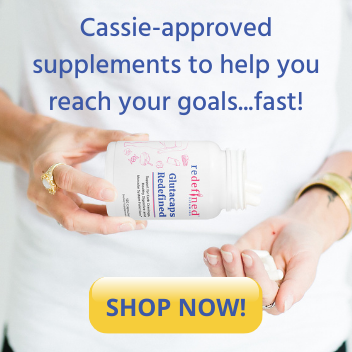It wasn’t until I had a client with sugar addiction, rock bottom energy levels, and continual weight gain that I had to dig deep and expand my expertise into what could help this young girl out.
The “client” was me.
One of the answers to my problems? Probiotics! I was surprised because when I was in school to become a dietitian, I was taught NOTHING about probiotics…other than the fact that yogurt has some.
Now, after working with thousands of clients through our virtual coaching program and formulating two of my own probiotics (Probiotic Redefined and Pure Bifido Redefined), I’ve come to learn that most people know very little – almost next to nothing – about probiotics.
The average Joe (or Jane) sees probiotics as something to take when you have intense digestive issues, or (rarely) something their doctor prescribes after a round of antibiotics. Most people believe that eating their daily cup of yogurt at the office is enough to keep their gut on track. (My dietitian school classmates and I downed yogurt like it was going out of style because we believed this myth, too!)
Here are the 3 most common myths we believe about probiotics:
Myth #1: Probiotics are only necessary for people with digestive issues.
Many of us see probiotics as something that can cure a temporary issue or discomfort. It’s commonly seen as a natural way to fix problems that some people might turn to Pepto-Bismol to cure—stomach cramps, diarrhea, gas… But, as we now know, probiotics do so much more than that. They play a vital role in increased energy levels, easier weight loss, better sleep, reduced sugar cravings, improved skin conditions, a stronger immune system (meaning less sick time!) and much more. There is so much good that probiotics can do!
Myth #2: I can just eat yogurt.
This is what I believed in dietitian school, and it’s what we’re being told through TV ads, magazines, the media, and of course, yogurt product labels.
Yogurt can be a source of probiotics—and it’s the #1 food associated with probiotics. But here’s the problem: there are no regulatory standards for yogurt! (Similar to the supplement issue.) Questionable strains can be in there. And no one knows how much —or how little—is really in each serving. Yogurt can be beneficial (so long as it’s not loaded with sugar), but taking a probiotic supplement is still critically important, even when getting in a daily dose of yogurt.
Myth #3: Probiotics are all created equal.
This is not even close to being true, and yet, a lot of people don’t realize it. Probiotics can vary significantly in potency, efficacy, and safety. Just like supplements in general—4 out of 5 of the ones on shelves can be totally ineffective—they may not even have in them what the labels say, and instead can contain a dangerous mix of ingredients as outlined in a study that came out last year. This means your probiotics may contain harmful ingredients, like bad pathogenic bacteria that can make you sick and fat! Or, the bacteria could be dead, rendering them useless. That’s why it’s oh-so-important to be selective when determining which probiotic to take. NOTHING breaks my heart more than seeing you diligently trying hard only to realize your efforts were pointless, or worse—provided more harm than good. That’s why I formulated Probiotic Redefined and Pure Bifido Redefined—two probiotics with clinically researched strains that you can trust and feel awesome taking, knowing they’ll always be top-notch quality.
So what’s a person to do?
You have two options: you can do the research on your own or go through someone you trust.
If you do your own research: Things you’ll want to consider: the type of probiotic (genus, species and the specific strain), the # of CFUs (Colony Forming Units) and whether or not those are clinically researched, the Potency Guarantee (potency at the time of manufacture and at expiration is NOT the same thing—only products that guarantee potency at expiration assure reliable dosing from start to finish). That’s a lot of stuff, so it’s no wonder we’re overwhelmed!
If you go through a trusted healthcare professional: Transparency is key. Make sure you’re able to ask questions. You want to know that every single batch is tested for quality, what sort of testing is done and that there is documentation of this specific testing. The FDA doesn’t approve probiotics so third-party testing is something that’s not required—it’s expensive and a lot of work so most companies don’t do it. Viability testing and strain identification testing are a couple of the tests that I think should be required. Of course, we do all of this with our Redefined Vitamins line. I got tired of having to read every little word on every probiotic bottle, so I developed two probiotics that are of the highest quality and third party tested so we KNOW of the efficacy. And of course I know exactly what’s in it—clinically researched strains—and what’s NOT in it—no junk fillers or sweeteners or other toxic ingredients, EVER! You can relax knowing these ingredients won’t change.
If you want to skip past the research on your own, I’ve got you covered. We see results with both the powdered probiotic and the capsule form every day with our clients. You can expect your energy levels to improve, bowel movements to regulate if needed and weight loss to become easier. And of course, we’re transparent and open to your questions! Everyone can benefit from taking a quality probiotic!











